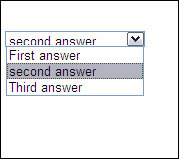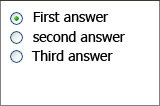Formative and Summative Techniques to Be Applied
In the selection of a viable method for assessment, and the feedback that will be given thereof, the formative and summative roles will apply the increasingly popular computer-based test known as cloud computing.
Generally speaking, cloud computing simply refers to a service mostly conducted over the internet with the aim of providing some type of important computer-related services to an individual or organization. The specific types of services in cloud computing vary widely from one user to the other.
Remarkably, cloud computing heavily borrows from traditional methods of computing and, more often than not, works interdependently with them.
Probably, this might be the reason some people tend to confuse it with related technologies like grid computing, utility computing and autonomic computing. Even more specifically, the following strategies will be used for the assessments:
- Formative Assessment: Question and Observation Tests.
- Summative Assessment: A Blend of End-of-Chapter and End-of-Term Tests.
Nature of the proposed Formative and Summative Test Techniques
To begin with, a hybrid cloud will be created where users blend the utilization of both public and private clouds. In order for them to do this, they must all register in the rightful place using the Azure platform.
On finishing the registration, the users will get a password which will allow them to log-in into the system. For the formative test involving questions being asked to the students and observation by the tutors, no grading will be done.
The feedback will, however, be used to help the learners improve their weak areas. For the summative test involving the end-of-chapter and end-of-term tests, grading will be done. Irrespective of whether it will be formative or summative, all learners must take their tests seriously.
Again, since the test will be in multiple choice formats, learners are advised to be eloquent with the various techniques used in answering multiple choice questions. Examples of methods used here include the following:
Drop-down list selections

Checklist

Bullet Choice

Ensuring that the Assessments Go as Planned
The Azure platform was primarily established to encourage networking interdependency by the use of clouds. This will, therefore, ensure that several students and tutors can interact easily with other members of their cloud.
Again, the availability of live ID tools and enhancements like IM, discussion boards and email will allow for easy interaction among the students (Nishithraj, 2009).
To ensure high interactivity and interdependency among learners, a hybrid cloud will be used. This will make certain that the testing systems blend the performance of public and private clouds thus giving maximum efficacy to learners.
Since Azure is available in many versions that can be downloaded and installed on operating systems like Windows Mobile, Windows Vista, Windows XP or even Macintosh; learners will be able to easily select the installation method that suits them. This is, especially, important for the proposed formative assessments.
Finally, all the four Azure service platforms (Windows Azure,.NET services, SQL Services and Live Services) will be duly incorporated in relevant areas to facilitate easy use of the Azure platform (Jacobs, 2009).
More specifically, ASP.NET 4.0, which has been lauded as a very good programming language, will be used on the Azure platform. This will ensure that the graded summative assessments are conducted in a uniform and objective way that encourages fairness.
Validity of the Proposed Tests
A good number of methods of confirming the validity of the tests have been detailed in the previous section. Nonetheless, the following points justify the appropriateness and validity of the proposed tests.
- Blending good questions and the technique of observation will give the students a variety of options for expressing themselves. In addition, through observation, the tutors will be able to assess the legibility of answers by the student.
- Through the end-of-chapter and end-of-term tests in the summative assessment, the teachers will be able to have a circumspect insight into the strengths and weaknesses of their students as well as their teachings.
- The grading of the summative tests can be used for future reference—especially for those who would like to assess progress over a given period of time.
Conclusion
Just like most projects, some challenges are expected. For example, Integrating cloud computing—especially on institutions that still have the old computing systems is quite costly, hectic and difficult for many users. Again, In spite of the high security of clouds, no IT system is ever fully impermeable to hackers.
Finally, feedback from the system will depend on the service used. For example, the feedback in IM is faster than that of emails. This might pose some logistical differences in communication among the learners.
Nonetheless, relevant measures have been put in place to avert any serious damage that might be caused. For instance, for the observation and questions asked in the formative assessment, highly professional tutors will be used and inclusively representative questions will be asked.
For the summative assessments, proper learning in the areas of testing will be done prior to the exams. Learners should, therefore, be assured of a smooth sail when taking the tests or receiving feedbacks.
References
Boston, C. (2002). The concept of formative assessment. Web.
Jacobs, D. (2009). Microsoft azure services platform: opening up cloud computing. Web.
Nishithraj. (2009). Cloud computing through. NET. Web.